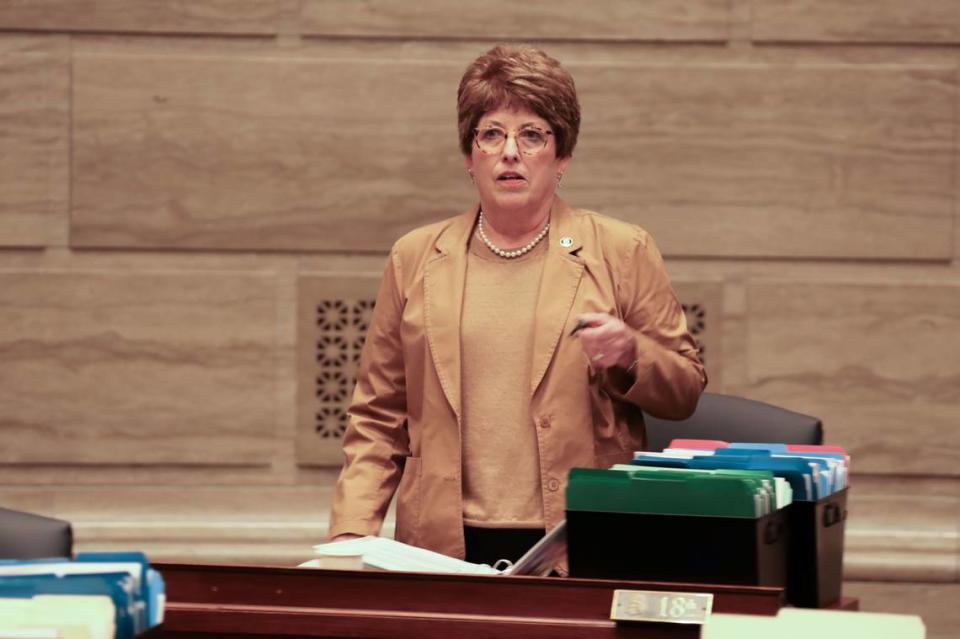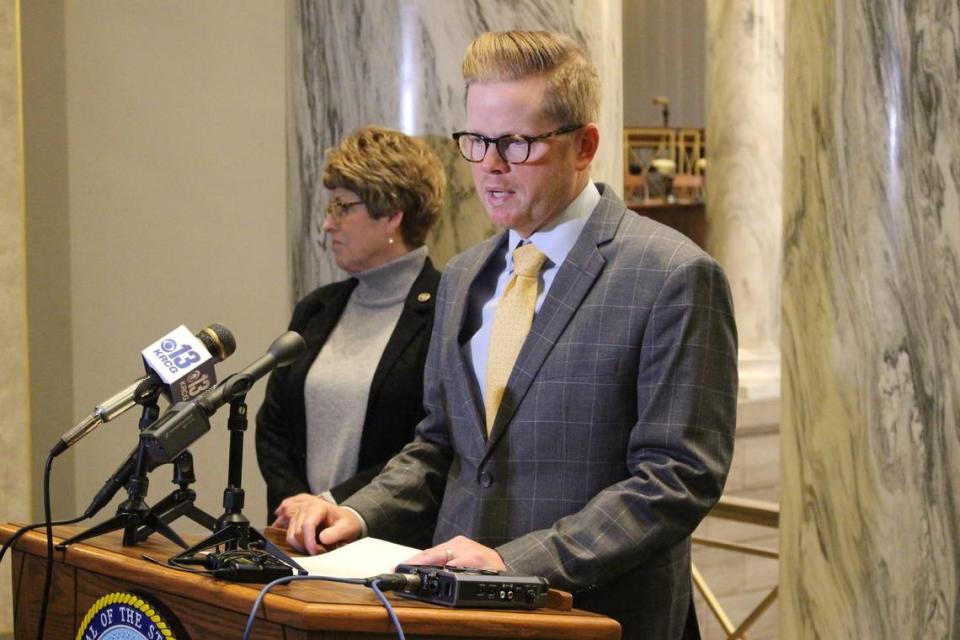Missouri voters likely to reinstate abortion rights if given the chance, Republicans say
As Missouri girds for an anticipated fight at the ballot box next year over an amendment overturning its near-total abortion ban, some Republicans have begun saying they expect a majority of voters to support restoring access to the procedure.
The stark admissions have also been accompanied by intense efforts to make it harder for Missourians to amend the state constitution – an extraordinary acknowledgment that the Republican-controlled General Assembly must erode direct democracy in the state or risk decades of anti-abortion policy unraveling in a single election.
“I think we all believe that an initiative petition will be brought forth to allow choice,” House Speaker Dean Plocher, a St. Louis Republican, said Friday. “I believe it will pass. Absolutely.”
Plocher’s remarkable comments come near the beginning of what is almost certain to be a furious 18-month race to the November 2024 general election, when an abortion rights amendment is likely to appear if one qualifies for the ballot.
Missouri, the first state to ban abortion after the U.S. Supreme Court overturned Roe v. Wade in June 2022, could also potentially become the first state where voters reverse an abortion ban.
Ending the ban would be a seismic event in Missouri, opening a path for the return of abortion clinics after years of restrictions imposed by the General Assembly effectively whittled access down to a single location in St. Louis even before the ban, sending residents into Kansas, Illinois and elsewhere for the procedure.
Eleven amendments have been proposed so far that would allow various levels of abortion access and abortion rights supporters are expected to seek signatures through an initiative petition to place at least one on the ballot. Republican lawmakers have until then to pass an overhaul to the initiative petition process that would raise the threshold for passing an amendment at a statewide vote – and, the thinking goes, place a victory out of reach for abortion rights supporters.
A compromise lawmakers agreed to last week but couldn’t pass through the Missouri Senate would have required amendments to receive 57% of the vote instead of the current simple majority, a threshold that would have prevented recreational marijuana legalization from passing last November (the measure received 53% of the vote). GOP leaders have already said they will try again next year.
Whatever changes the General Assembly approves must then itself go to a statewide vote and pass with a simple majority. Republicans have signaled they would try to win support for the overhaul with arguments that the state constitution, at 253 pages, has grown too complex and that a higher bar for passage will require amendments to receive more buy-in from rural voters.
One idea that was discarded during negotiations, but could be revived next year, would require amendments to also win a majority of congressional districts if they only obtain a simple majority statewide. The change would empower residents in the rural areas to block amendments even if a majority of voters support them.
“The threat of abortion with no restrictions looms large and we are committed to finding the answer early next year. That timeline allows us to see the actual language of abortion advocates and plan a path to defeat it,” Senate Majority Leader Cindy O’Laughlin, a Shelbina Republican, wrote in a newsletter to constituents Monday explaining that the Senate would act on initiative petition changes in 2024.
The anti-abortion group Missouri Right to Life has been even more blunt, calling the initiative petition overhaul the “Resolution to Protect our Constitution and ‘Keep Missouri Pro-Life.’”

‘A dramatic expansion’ of abortion access
For abortion rights supporters, the urgency among Republicans and abortion opponents only underscores their belief that they hold the upper hand with voters.
“We know that Missourians’ positions and personal thoughts on abortion can be nuanced and complex, but regardless of an individual’s personal opinions, by and large, they do not think that it is politicians’ business, and they don’t think that politicians should have the final say over individuals’ access to this basic health care,” said Mallory Schwarz, executive director of Pro-Choice Missouri.
Polling by Saint Louis University and YouGov of nearly 450 voters in August 2022 found that 48% support reversing the ban, while 40% would vote to continue the ban. The question had a margin of error of plus or minus 5.93%.
The poll appears to show Missourians support some restrictions on abortion, even if a plurality also support overturning the state’s ban. While 58% of voters said abortion should be legal during the first eight weeks of pregnancy (a period during which many women don’t know they’re pregnant), only 40% said it should be legal through the first 15 weeks compared to 46% who said it shouldn’t.
Just 32% said abortion should be legal when a woman wants one for any reason. The poll didn’t ask about support for legal abortion up to the point of viability (around 24 weeks).
While all of the pending petitions would guarantee the “right to reproductive freedom” in the state constitution, they range from allowing all abortions to only restricting abortions after a certain time period such as 24 weeks.
“Without knowing what policy might be able to move forward, we have an opportunity to create a level of access that has not existed in years with something that can pass,” Schwarz said. “And I think the policies proposed could restore 99% of access in our state and would be a dramatic expansion of access broader than we’ve seen in Missouri in decades.”
Anna Fitz-James, a retired St. Louis pediatrician, filed the Missouri petitions in March on behalf of a political action committee called Missourians for Constitutional Freedom. The group appears to have no public presence, hasn’t responded to reporter phone calls, and reports to the Missouri Ethics Commission show it has raised very little money, if any.
Fitz-James declined to comment. Michael Pridmore, Missourians for Constitutional Freedom’s treasurer, didn’t respond to a request for comment.
Tori Schafer, deputy director for policy and campaigns at the ACLU of Missouri, said lawmakers “know abortion is popular, and that’s why they’re afraid of majority rule.”
The ACLU of Missouri is representing Fitz-James in a lawsuit against Missouri Secretary of State Jay Ashcroft, Attorney General Andrew Bailey and Auditor Scott Fitzpatrick, all Republicans, over delays in posting official ballot summaries and fiscal notes for the petitions. A scheduling hearing is set for Wednesday.
Even though some Republicans say that while an abortion rights measure of some kind could pass, its chances depend in large measure on how far the proposal goes in allowing the procedure. Senate President Pro Tem Caleb Rowden, a Columbia Republican, said it would depend on “what the left does.”
“I think if the political left decided that they were going to be reasonable in how they put something on the ballot relative to abortion, they probably have a chance,” Rowden said.

Abortion rights supporters have won every statewide election on abortion access across the country since the end of Roe last June. More than 59% of Kansas voters in August rejected an amendment that would have allowed state lawmakers to ban abortion – the first election since the Supreme Court decision. Other states – including Kentucky, Montana and Vermont – have followed in voting in favor of abortion rights.
Against that backdrop, Missouri Senate Minority Leader John Rizzo, an Independence Democrat, said Republicans had “let the cat out of the bag” after Plocher tied the initiative petition overhaul to abortion.
“If he wants to explicitly link abortion or the ability for a woman to have autonomy over her body to (initiative petition), great,” he said. “They won’t like the outcome of that. I promise you. Go ask Kansas.”
Fights over ‘ballot candy’
Missouri Republicans have been trying to restrict the initiative petition process for years, either by tightening signature-gathering requirements or raising the bar for passage at a statewide vote. The proposals have never passed, either becoming overtaken by larger priorities or bogged down by infighting.
But Republicans have now linked the initiative petition overhaul effort to one of their core political issues – opposition to abortion – in a way that could place enormous pressure on any GOP holdouts.
Peverill Squire, a political science professor at the University of Missouri-Columbia, said Republicans could have likely headed off some of the anger at the state’s ban if they had enacted additional exceptions this year. However, the potency of abortion politics among the Republican base makes that effectively impossible.
“They’re in a position politically within their primaries where they can’t really do that,” Squire said. “And so now they’re facing giving the voters a choice of all or nothing.”

Samuel Lee, a lobbyist for the anti-abortion Campaign Life Missouri, said a proposal with enough “ballot candy” – official ballot summary language that entices voters – could have a chance of passing with a simple majority (opponents of initiative petition changes have also leveled “ballot candy” accusations at GOP proposals).
But whether any of the 11 abortion amendments currently put forward could pass is a different story, he said.
Democrats have issued their own criticism of the deceptive ballot language on the initiative petition proposal that would be placed in front of voters, saying that Republicans were using confusing “ballot candy” to get voters to agree to take away their voting power.
The ballot initiative considered by lawmakers this year would have asked Missourians to “Allow only U.S. citizens to vote on ballot measures,” despite the fact that the Missouri constitution already requires voters to be U.S. citizens. State Rep. David Tyson Smith, a Columbia Democrat, last week likened the summary to “dog poop with icing on it.”
Ashcroft, who is running for governor, has proposed a summary for the abortion amendments that would say that they “allow for dangerous, unregulated, and unrestricted abortions,” according to late April letters from Bailey to Ashcroft that have been released publicly.
“They know that in order to block an abortion access ballot from being able to get the votes that it would need, they have to rely on tactics of manipulation and coercion,” Schwarz, the Pro-Choice Missouri director, said.
Lee called Ashcroft’s proposed language “pretty strong stuff” but acknowledged a lawsuit will probably be filed against it.
“The voters will decide based on what’s in front of them,” Lee said, “And the jury’s still out on what is even going to be promoted.”

